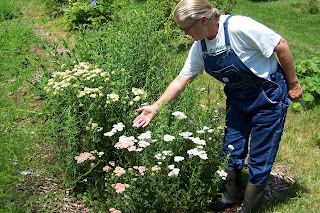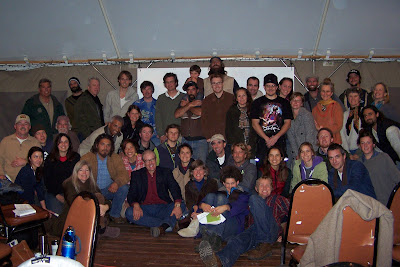This week the blog shares a few snapshots from the fields, gets you ready for what's soon to be coming from the farm and a NEW PODCAST takes you on one of our regular walks in the field.
Susan shows off her multi-colored yarrow in the perennial herb garden, a mixture of culinary and beneficial herbs that she tends in our "kitchen garden". Also includes tarragon, mint, oregano, lemon balm, thyme, rosemary and others that we harvest for friends and fine meals.
One of our experiments this year includes growing small plots of grain. We planted heritage organic/non GMO oats, barley and field corn. The harvest of these crops is going to be done "old style" by hand. We're still not sure how this all works, but you see, sometimes you just have to toss your hat over the fence. 
Our rows of feed corn are planted much less densely than most for a reason. We used the simple tools we have and took care to keep our plants spread apart to reduce the demand for fertility in the soil. We're doing what we can to learn from the ground up and take it slowly. What we learn this year, will prepare us to take the next step. This is yellow dent corn, a heritage variety from the 1840's. Growing these big corn plants with a long season means we're taking some chances on this old time variety. The payoff is in producing a harvest of open pollinated seed to plant next year. 
As I mentioned in the podacst, this is a row of cucumbers planted in a bed row which was planted in green manure last summer. The oats and vetch were mowed down and disc-ed into the soil. The plant material is still breaking down to feed these young plants. If you click and enlarge the picture you'll see mushrooms popping up to help breakdown organic matter and transfer nutrients to the plants and to beneficial organisms in the soil. Behind them is a row of white clover that is also acting as bee pasture - attracting pollinators into our crop rows to ensure each flower produces on these plants. This biological activity is exactly what we're after.
Coming in the next week - we'll be moving from planting, weeding and cultivating to picking and harvesting sweet peas, yellow beans and that delicious, tender summer squash.
Follow the blog for more on what we have for you! If you happen by our farm on Rte. 17 in Murray Harbour North, PEI, look for our roadside sign to tell you you what's fresh and healthy from the farm!
CLICK - HEAR TODAY'S PODCAST
You are welcome to add our podcast to your online or broadcast programming. All I ask is that you contact me to let me know your broadcast plans/needs and I will do my best to cross-promote your program on this blog. You support healthy soil and organic farming when you support organic farmers!


















































